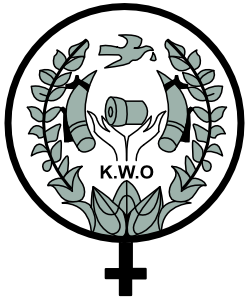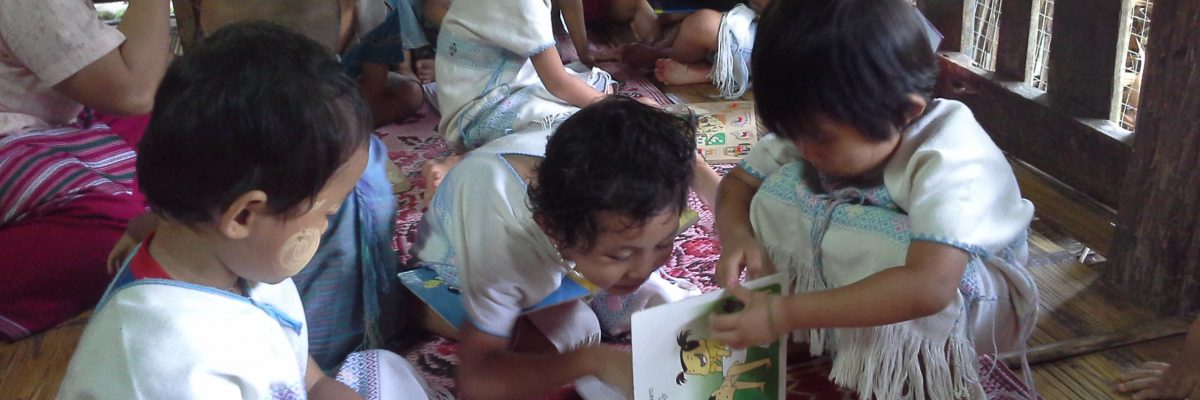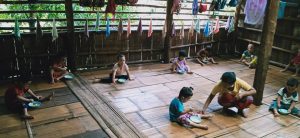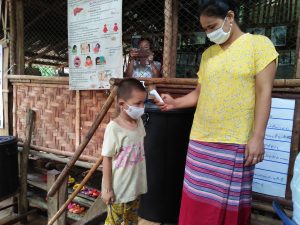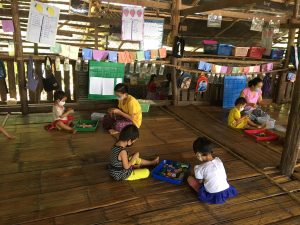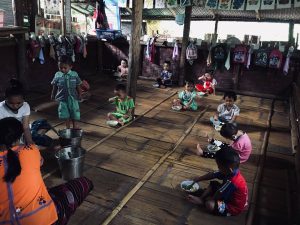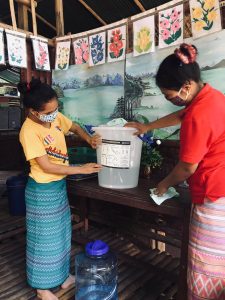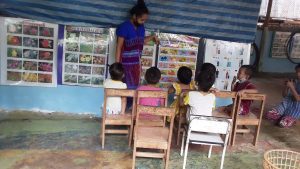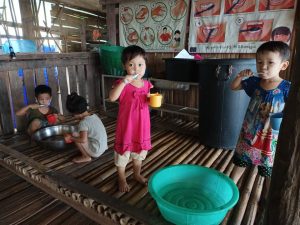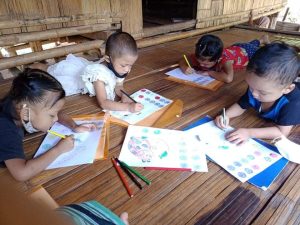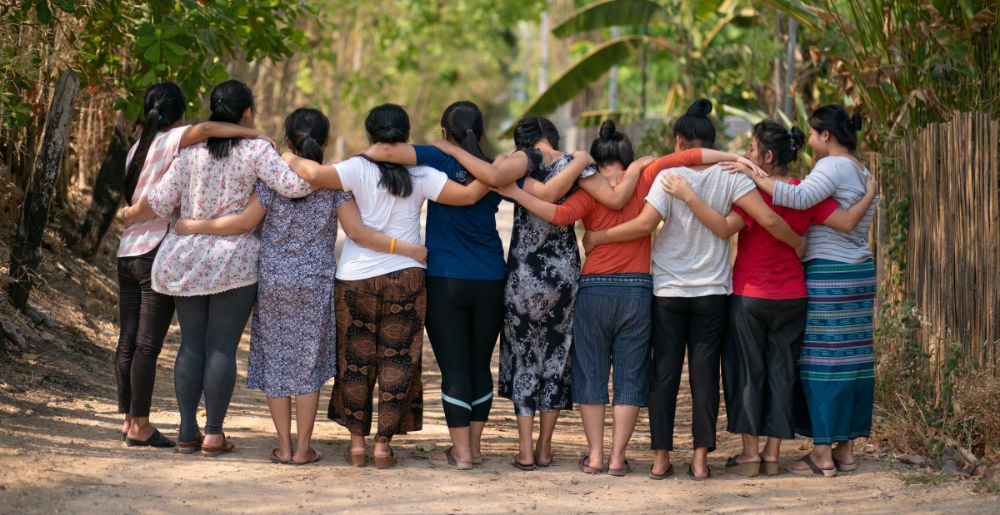Very young children are the most vulnerable group in any community and women are the main carers. Young children require a lot of support to develop and be healthy. For women to participate fully in community life, they need safe childcare for young children. KWO established Nursery Schools in refugee camps to address these two needs.
1. Project Goal
The project will improve the physical and emotional well-being of children aged 2.8 to 5 years in Mae Ra Ma Luang and Mae La Oon refugee camps. This will help prepare the children to enter Primary Schools in a safe environment while further building community skills and knowledge for good childcare practices.
2. Location
We implement this project in 2 sites:
- two Karen refugee camps, Mae Ra Ma Luang and Mae La Oon, which are in Mae Hong Son Province, Thailand.
3. Overview
KWO has been running nursery schools in the refugee camps since 1995. Currently we have 18 Nursery Schools in two refugee camps under this project, where we provide basic education and safe childcare services that promote physical, mental and social development of each child equally.
The Nursery Schools are actively inclusive of young children living with a disability and receive classroom support from the KWO Special Education project teachers. We have developed our own Early Childhood Curriculum which promotes Karen indigenous culture and learning in our mother-tongue. We support good hygiene and nutrition for young children through education and a daily feeding program.
There are about 1,500 children aged 2.8 to 5 years enrolled in the 18 Nursery Schools each year. The smallest nursery school has about 40 children enrolled, and the largest has over 100 children. The Nursery Schools are open for 170 days in the year. More than 200 women are trained as teachers for early childhood development and education. They care for the children in a safe environment, provide a stimulating learning program, create teaching and learning aids, and engage with parents to strengthen good childcare practices. Parents and community members are actively involved in the management of the Nursery Schools, fund-raising, and assist in some activities with the children.
This project is linked closely with KWO’s other Early Childhood Development Project which is implemented in Karen State, Burma. KWO co-ordinates with local ethnic education service providers inside Karen State and with refugee or INGO service providers along the border.
The schools are normally open 161 days a year, five days a week from 8.30am to 3:00pm. Nursery Schools organize the children into 3 age groups and the curriculum is similar for all children, with adjustments of difficulty for each age group. Class A= oldest children (4-5 years old); Class B= middle (3-4 years); Class C= youngest (2.5-3 years).
Parent Teacher Associations (PTAs) have been established in each Nursery School and provide a formal structure for involvement of parents and community members. The PTAs meet at least monthly, and more often whenever there is a need. There are 11 positions in each PTA and about 50 members per school. Positions of responsibility include the Chair, treasurer, and group leaders for school buildings, for home visits to families with the Capacity Building Trainers, for working with the teachers in the classroom.
4. Beneficiaries and Participants
In the 2023-24 academic year:
- 1,440 children under 5 years of age benefitted from safe childcare, education appropriate to age, and improved hygiene and nutrition.
- About 3,000 parents and carers developed deeper understanding of child development and better parenting.
- 1,400 women accessed reliable, safe childcare and increased their participation in community work, decision-making processes, and income generation.
- 220 project staff were employed: 218 are camp-based staff, mostly teachers, plus 2 town-based staff
5. Main Activities
The main activities we conduct are:
- Early childhood development and care program
- Protect and promote child rights among children and their families
- Hygiene education and supplies
- Nutritious feeding program to reduce chronic malnutrition.
- Maintenance of 18 buildings and compounds to ensure a safe and comfortable learning environment for children.
- Purchase and deliver school supplies
- Produce local teaching aids.
- Develop and apply our early childhood curriculum for indigenous children.
- Training of Trainers workshop
- Teacher Training and mentoring throughout the year, especially targeting all new teachers and less experienced teachers.
- Provide formal “Parents Education” workshops using the “Parents Education Manual” which has been developed by KWO.
- Home visits to parents and children needing more support
- Capacity Building for the 18 Parent Teacher Associations (PTAs)
- Maintain and strengthen child protection standards and practices among all staff and with the community.
- Coordination and engagement with ethnic education stakeholders, International agencies, and Parent Teacher Associations.
- Community-based fund-raising activities
- Organise Family Days and Special Events.
6. Who does the work?
There are currently 220 project staff implementing this project. 218 are camp-based staff, (120 in Mae Ra Moe and 98 in Mae La Oo) plus 2 town-based staff. Among the camp based staff there are 122 early childhood teachers and trainers. And there are 18 cooks, one per school. Almost all staff are women, plus a small number of men in auxiliary positions as building maintenance or babysitters.
7. The Impact
We asked parents and staff to identify the benefits of this project. These are the main areas of development each year which they identified:
Improvements in Health and Physical Well-being of Children
We see that children are growing physically and appropriately for their age, because of regular eating, sleeping, and playing time that is managed by the teachers. The lunch program is really beneficial for the children and the hygiene teaching and support also. They learn how to eat carefully and on time. They grow taller, put on weight and normal physical movement because of the good food. They are sick less often because they learn good hygiene, and when they go home, they share what they learnt with their parents and they influence the whole family.
Access to Safe Childcare for Women and Improved Gender Equality
The nursery schools provide safe places for parents to leave their small children during the day. This impacts women especially, who are the primary caregivers. By providing safe daily childcare services, this project increases the child-free time that women and mothers have each day. Women therefore have greater access to income-generation and participating in community decision-making processes. We have seen that as a direct result of Nursery Schools running well each day, more women take part in the community’s work, influence the decisions and participate in activities. There is improved gender equality across the community.
Improvements in Emotional and Social Skills of children
Children have more confidence after attending nursery school and their behavior changes. At Nursery School they learn how to share and how to have safe and enjoyable relationships with others. The children learn to support each other. They improve in helping their friends and in their own self-help, such as putting on the school uniform, arranging the blanket or mat, keeping clean, and sweeping the floor. They learn to obey their teachers, and how to ask questions during the class. They also accept suggestions more easily from parents, teachers and friends. Furthermore, they learn to respect the elders as well as younger people. They become more confident by playing games together, practicing how to be the leader of a group, singing a song, and acting in a small role play or drama. After attending nursery school we see our children are better in relationships with other people. They develop in leadership skills and respect the needs of others.
Improved Hygiene and Safety for Children
Children develop an understanding of self-cleanliness. They know that they have to wash their faces and brush their teeth before/after waking up from the bed, washing their hands and food before eating it, after using the toilet, and have to change into new clothes before going to school. They learn to recognise their own property and take care of it. They learn a lot about safety and what is dangerous to do. They learn better control of their bodies so as not to fall down and get hurt when they are running. They also remind their friends and share the information about it.
Preparation for Smooth Transition into Primary School
Teachers use a variety of different teaching methods in Nursery Schools. As a result the children improve in their counting skills. Teachers created teaching aids for math that are more interesting for young children so they learn more easily and are able to recognize more numbers. The children get ready to go up to Primary School, with many of the subjects being introduced slowly in the Nursery School. Teachers create opportunities for children to use their imagination. They ask children about their interests and brainstorm to get more ideas. They ask children to draw. The children stretch their brain and create or express ideas of different things. When they come to school they learn about our environment and why it is valuable and how to care for it, and what it means for traditional Karen culture. Later the children take care of and value the earth and plants and animals and rivers.
Establish Solid Grounding for Reading and Writing
At the first year of school children are only singing and recognising the alphabet and poems. At the second year, children start to practice writing of alphabet but not so well. At the final year their reading and writing skills are much improved. After attending nursery school, children know how to take care of books. They put the books back on the shelves carefully and systematically. They do not tear the pages of the books anymore. And also they love listening to stories or reading simple books.
